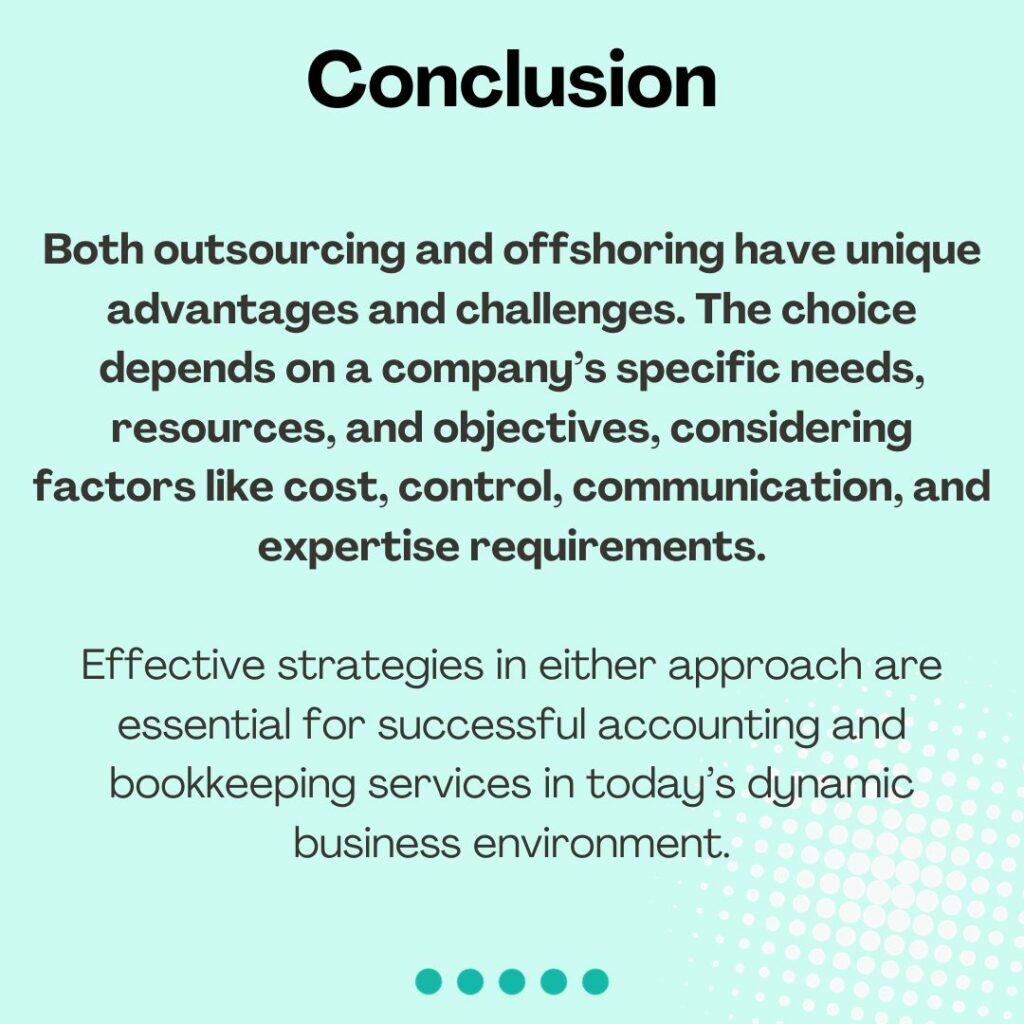5 Key Differences in the Context of Accounting and Bookkeeping Services
In today’s globalized business landscape, businesses are constantly seeking cost-effective solutions to streamline their operations and enhance efficiency. Two commonly used strategies in this regard are offshoring and outsourcing. While these terms are sometimes used interchangeably, they represent distinct approaches with unique implications, especially in the context of accounting and bookkeeping services. This article will explore the key differences between offshoring and outsourcing these critical functions, shedding light on their advantages, disadvantages, and suitability for businesses.
Click here to read our article on 5 emerging business models in the accounting outsourcing industry.
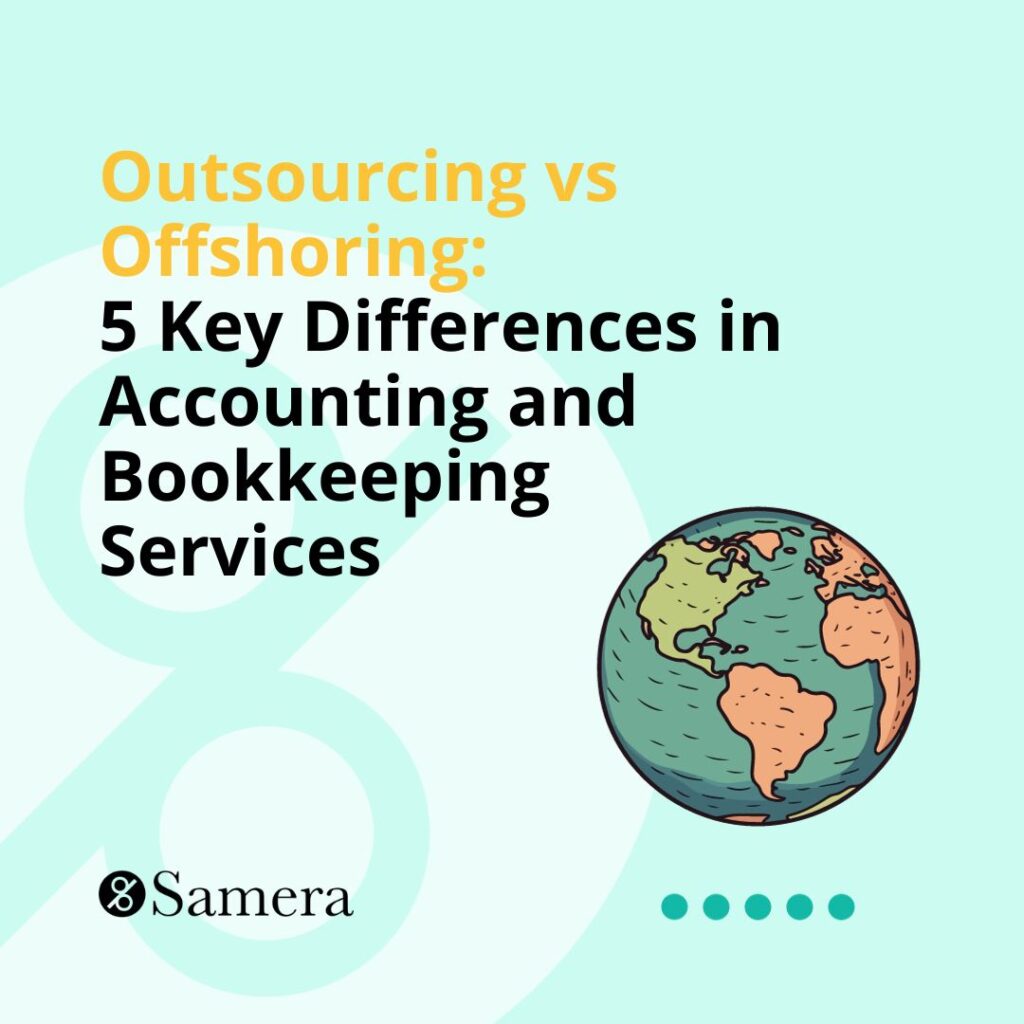
Outsourcing vs Offshoring – A Quick Overview
Before delving into the differences between offshoring and outsourcing, it’s crucial to understand what each term entails.
Outsourcing: Outsourcing involves contracting a third-party service provider, either locally or internationally, to handle specific tasks or services on behalf of a company. In the context of accounting and bookkeeping, businesses may outsource their financial tasks, such as payroll processing, tax preparation, or financial reporting, to external service providers.
Offshoring: Offshoring, on the other hand, refers to relocating certain business processes or operations to a different country, often with the primary goal of cost reduction. In the context of accounting and bookkeeping services, offshoring would involve setting up an accounting department in a foreign location, where the work is performed remotely but within the company’s structure.
5 Key Differences Between Accounting Outsourcing and Offshoring
Now, let’s explore 5 main differentiators that can help develop our understanding of offshoring and outsourcing specifically in the context of accounting and bookkeeping services:
1. Location of Operations
Outsourcing: When a company opts for outsourcing its accounting and bookkeeping services, it engages an external service provider. This provider can be located locally or in another country, depending on the outsourcing arrangement. The crucial aspect is that the outsourced work is performed entirely outside the company’s premises, often by a third-party specialist firm. This approach allows the company to focus on its core business activities while entrusting specific financial tasks to experts.
Offshoring: In contrast, offshoring involves establishing an accounting and bookkeeping department in a foreign country. Although the work is still performed remotely, it’s done within the company’s organizational structure, either as a subsidiary or a remote branch. The company maintains control over the offshore team’s operations, integrating them closely into its workflow. This approach provides more direct oversight and control but also requires greater investment in infrastructure and management.
To this end, Statista’s Leading Offshoring Countries research from 2021 indicated that India emerges as one of the most favored destination for offshoring due to the country’s attractive financial landscape, promising longevity and strong profitability for players [1].
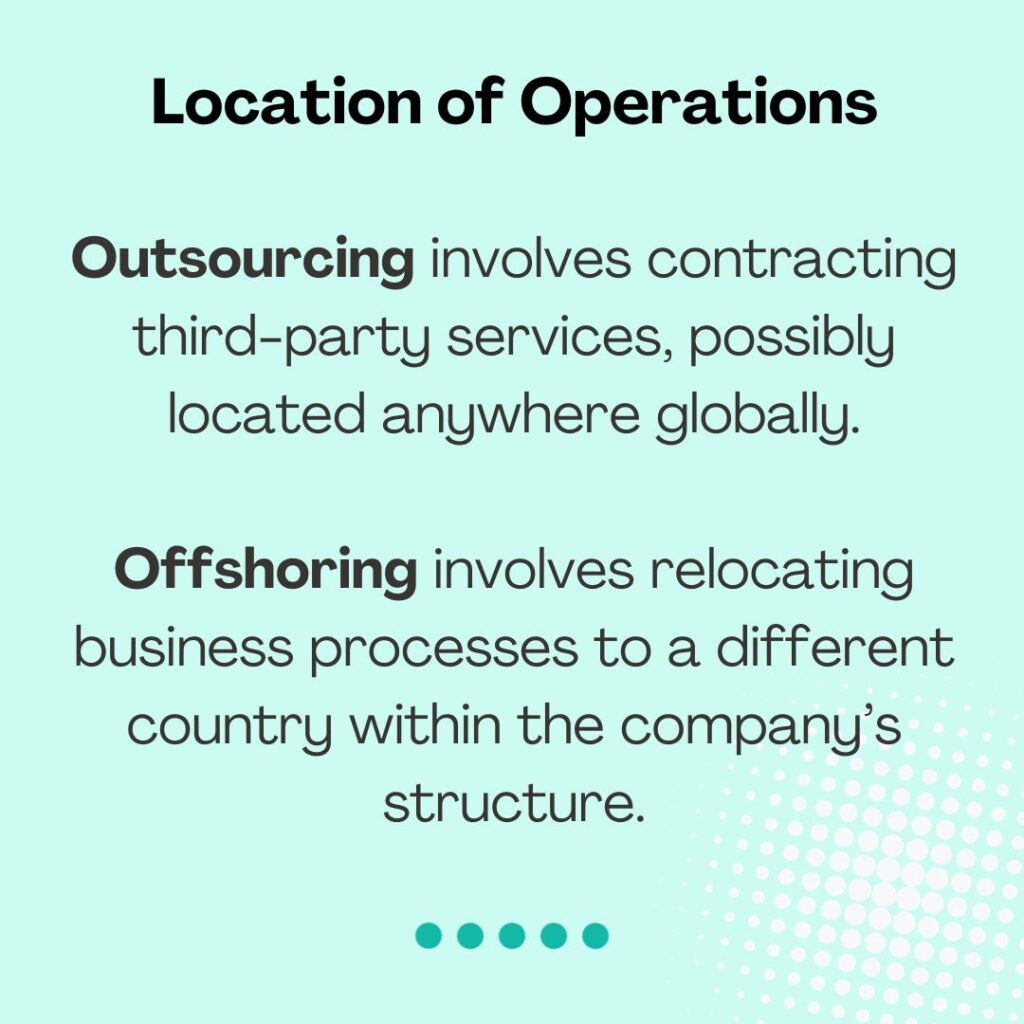
2. Control and Oversight
Outsourcing: In an outsourcing arrangement, the company retains strategic control over its accounting and bookkeeping functions but delegates the day-to-day tasks to the service provider. This allows the company to focus on higher-level financial decisions, while the outsourcing partner manages the routine financial processes. However, the company may have limited direct control over the service provider’s operations.
Offshoring: When a company chooses offshoring, it gains more direct control and oversight over the accounting and bookkeeping services. The offshore team operates as an integral part of the company’s structure, enabling closer monitoring and management. This can be particularly advantageous for businesses with complex financial operations, specialized requirements, or strict compliance needs, as they can maintain a tighter grip on quality and accuracy.
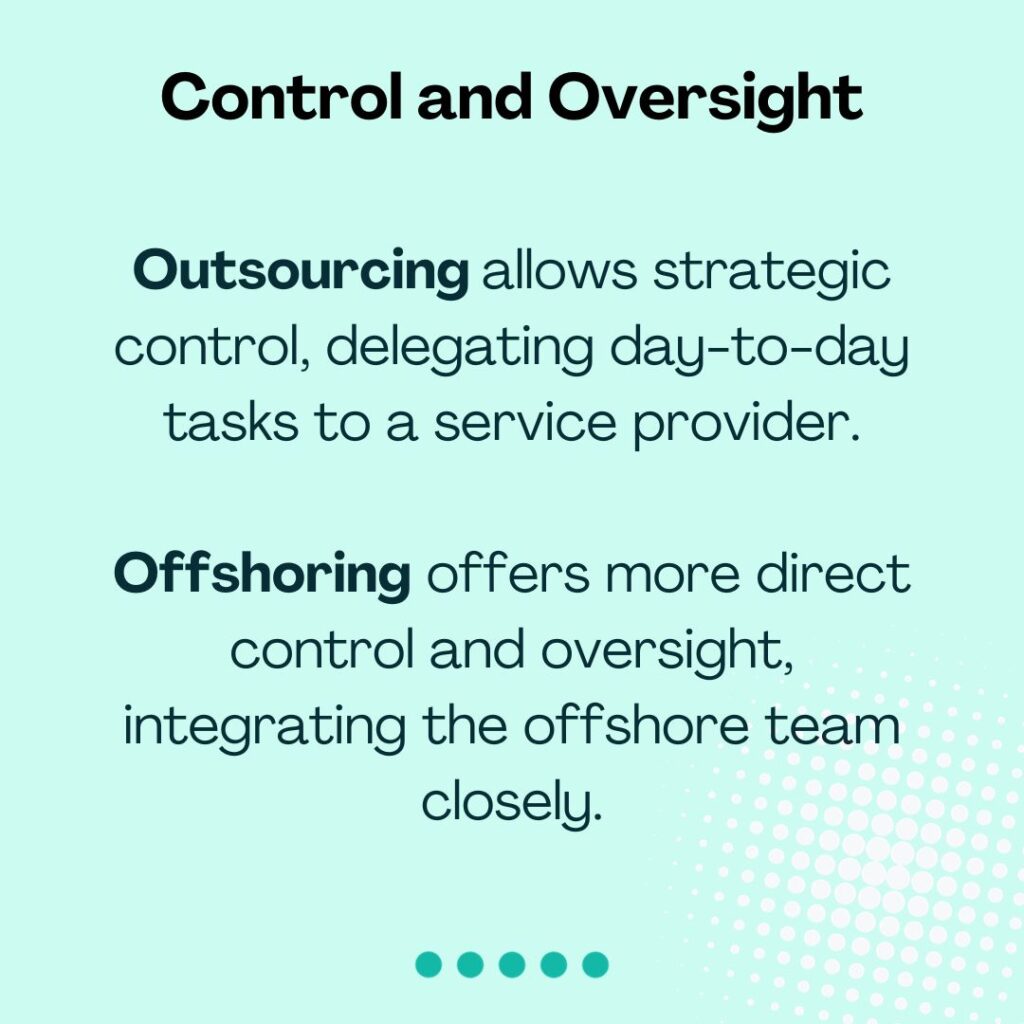
3. Cost Considerations
Outsourcing: The cost structure in outsourcing typically involves paying a fee to the service provider based on the services provided. While this fee is often predictable, it may vary depending on the scope and complexity of the tasks outsourced. Companies benefit from not having to invest heavily in setting up and maintaining an in-house department, making it a cost-effective choice for many.
Click here to read our article on 4 cost management challenges accounting outsourcing firms face and how to tackle them.
Offshoring: In offshoring, there are additional costs associated with setting up and operating an offshore department. These expenses may include office space, infrastructure, and local labor costs. However, over time, offshoring can lead to cost savings due to lower labor costs in the offshore location. It’s a long-term cost-saving strategy that may require a more substantial initial investment. However, it is important to point out that as per PwC’s The Evolution of BPO in India report, cost savings continue to be the main motivation behind offshoring [2].
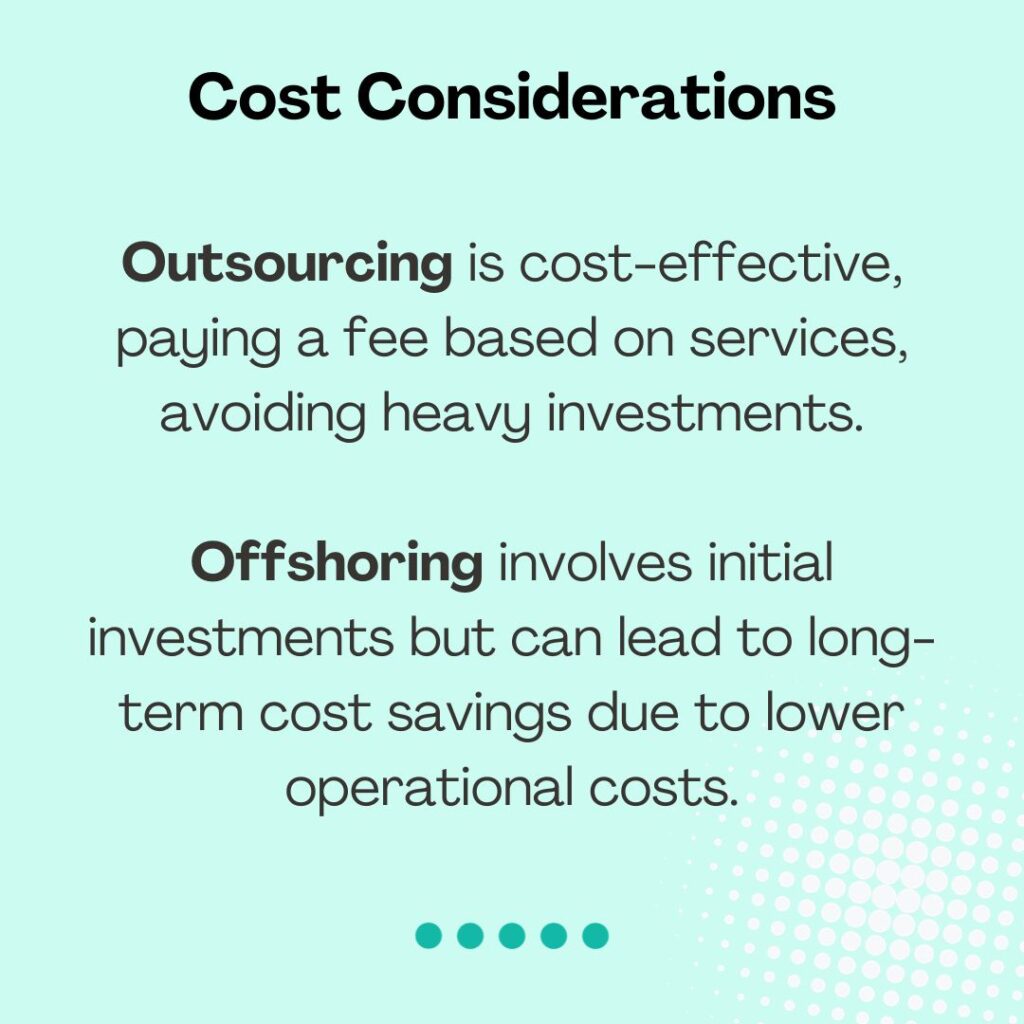
4. Communication and Time Zones
Outsourcing: Communication can be a challenge in outsourcing, especially when the service provider is located in a different time zone. Time zone differences can result in delays in resolving issues or obtaining information, which can impact efficiency and responsiveness. Companies must establish effective communication channels to bridge these gaps.
Offshoring: With offshoring, the company has the advantage of setting synchronized working hours with the offshore team, minimizing time zone-related communication challenges. This facilitates real-time communication and collaboration, making it easier to address issues promptly and maintain efficient operations.
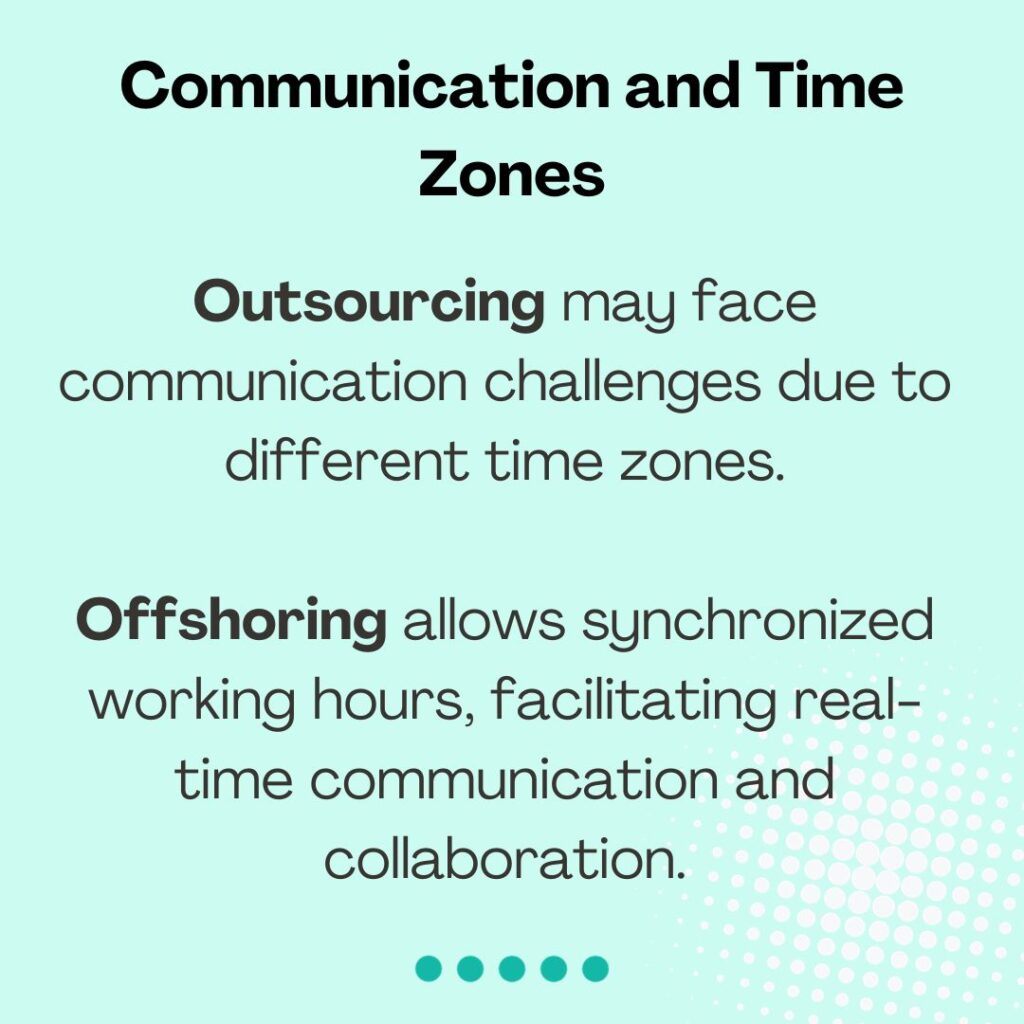
5. Quality and Expertise
Outsourcing: The quality and expertise of accounting and bookkeeping services in outsourcing depend on the capabilities of the chosen service provider. According to Upcity, when small businesses are selecting an outsourced team, the most critical factor is having robust problem-solving skills [3]. Companies rely on the provider’s reputation, experience, and expertise. While outsourcing providers often specialize in various financial services, it’s essential to choose a partner with a proven track record to ensure quality.
Offshoring: Offshoring allows companies to build and train their own accounting and bookkeeping team. This means they have more control over the selection, training, and specialization of their staff. Companies can ensure that their team possesses the specific skills and knowledge required to meet their unique financial needs, making it a suitable option for businesses with highly specialized or complex financial processes.
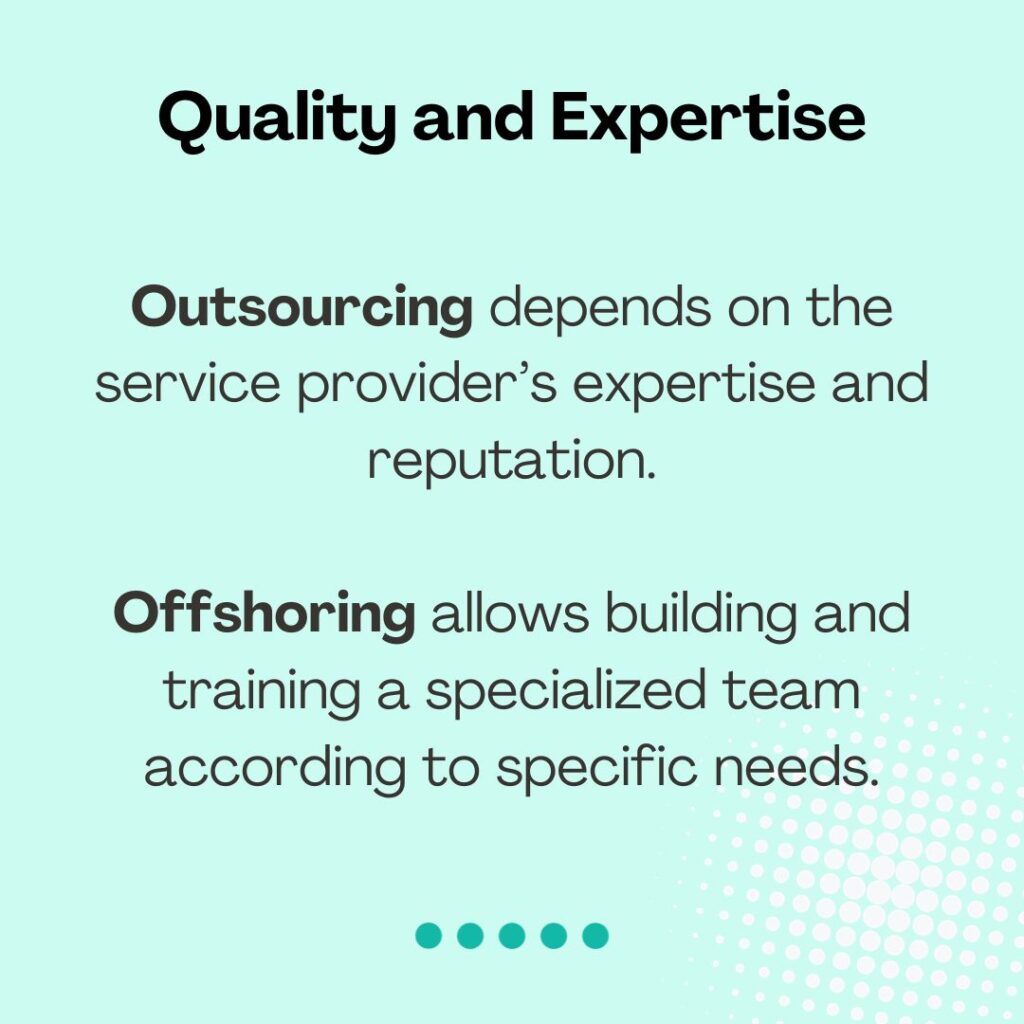
Click here to read our article on the impact and challenges of AI on accounting outsourcing
Did You Know?
- The worldwide tech offshoring market amounted to approximately $526.6 billion in 2021, and it is projected to grow to $682.3 billion by 2027. [Source: Satellite Office]
- In a survey conducted by Clutch, 24% of small businesses cited enhanced efficiency as their primary motive for outsourcing. [Source: Clutch]
Conclusion
When it comes to accounting and bookkeeping services, businesses must carefully consider their options between offshoring and outsourcing based on their unique needs, resources, and objectives. Both approaches have their advantages and disadvantages, and the choice ultimately depends on factors such as cost considerations, control requirements, data security concerns, and the need for specialized expertise.
For companies seeking cost-effective solutions with minimal upfront investment, outsourcing may be the preferred choice. However, those looking for greater control, customization, and the ability to build a specialized team may find offshoring to be more suitable. Regardless of the chosen approach, effective communication, data security measures, and compliance with relevant regulations should always be a top priority to ensure the success of accounting and bookkeeping services in today’s dynamic business environment.
